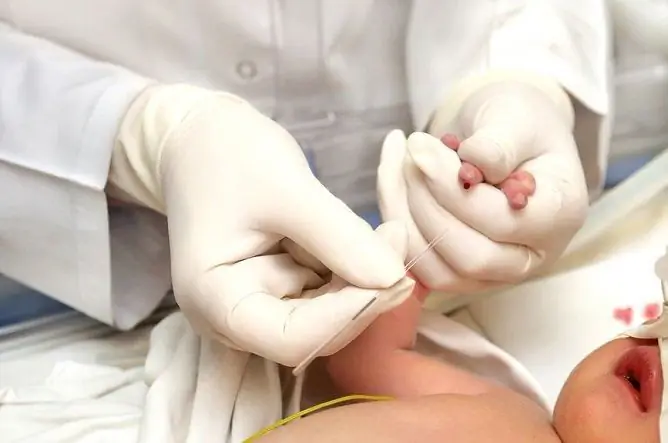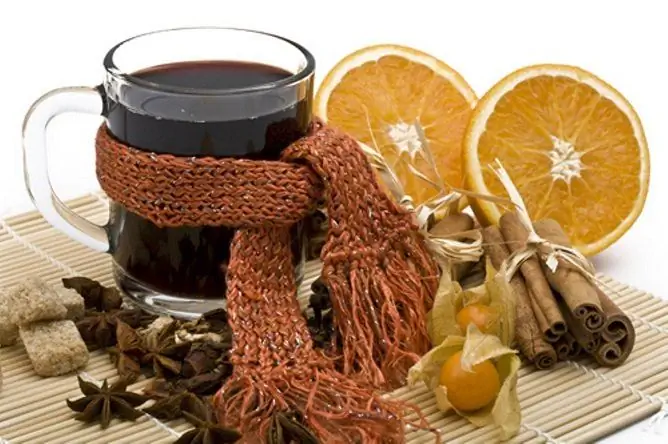- Author Rachel Wainwright wainwright@abchealthonline.com.
- Public 2023-12-15 07:39.
- Last modified 2025-11-02 20:14.
Wet and dry cough treatment: syrups for children from 1 year old
The content of the article:
-
Types of cough syrups that can be used in children 1 year and older
- Secretomotor syrups
- Mucolytic syrups
- Diseases in which cough occurs
- Video
Cough syrup for children from 1 year old is one of the most effective dosage forms. Such preparations have a pleasant taste, they are easy to dose, and they are quickly absorbed. There is a wide range of such medicines on sale, but we must remember that the age of the child is of decisive importance when choosing a medicine.
Before answering the question of which cough syrups can be used for children from one year old, it is necessary to find out the cause and nature of the disease. For various types of cough, drugs from different groups are recommended.

Cough syrups have a pleasant taste and are quickly therapeutic.
Types of cough syrups that can be used in children 1 year and older
Medicines can be of herbal or synthetic origin. Herbal expectorants are recommended for children over 3 years old. This is due to the possibility of developing allergic reactions. However, if the child's allergic anamnesis is not burdened, they can be given at an earlier age.
Sputum consists of two main fractions: a thick jelly-like one based on mucin and a liquid, water-soluble one. Depending on which component of bronchial mucus is affected by the drug, they are all divided into two main groups: secretomotor and mucolytic drugs.
Secretomotor syrups
Secretomotor syrups for dry coughs for children from a year are prescribed to stimulate the production of a liquid component of sputum, they can also be used for wet coughs. Moreover, they can be of two types: reflex and resorptive. Reflex indirectly affects the vomiting center, stimulating the formation of a liquid fraction of bronchial mucus, thereby providing its liquefaction. Resorptive acts directly.
The most effective secretomotor cough syrups for children from 1 year old, list:
- Gedelix (ivy leaf extract). In addition to mucus-thinning, it has an antispasmodic effect, helping to relax the smooth muscles of the bronchi. At the same time, the lumen of the respiratory tract expands, and the discharge of sputum improves. The syrup has a neutral, sweetish taste. It is taken in small portions, dosed with a special measuring spoon. Contraindicated in children under 2 years old, due to the presence in its composition of mint, anise and eucalyptus oils that can provoke an allergic reaction. Usually the remedy is well tolerated, but in some cases it can cause nausea, vomiting, diarrhea, and decreased appetite. Gedelix cannot be combined with antitussives.
- Licorice syrup. Contains plant root extract as an active ingredient. It can be used in children from one year old, while the dosage of the drug is determined by drops. In rare cases, there are side effects from the gastrointestinal tract, the phenomenon of intolerance. Some manufacturers combine the active substance with other medicinal ingredients: for example, vitamin C, thyme, echinacea, rosehip, elderberry. In this case, special attention should be paid to the portability of the components of the syrup.
- Herbion. As an active ingredient, this syrup may contain liquid extracts of the roots of plantain, thyme, primrose, mallow, ivy. Depending on the predominant active ingredient, the syrup is recommended for dry or wet cough, which is indicated by the manufacturer directly on the package. The drug is contraindicated in children under 2 years of age and in patients with intolerance to the components of the syrup. In addition to the expectorant effect, Herbion has a pronounced anti-inflammatory effect, helps to eliminate spasm of the muscles of the bronchi, expanding their lumen.
- Prospan. It also contains ivy leaf extract as an active ingredient, can be taken by children from 1 year old. The drug is given up to 3 times a day, the course of treatment lasts an average of 7 days, plus 2-3 days after stopping the cough.
When taking secretomotor syrups, you need to consume a large amount of drink. Dr. Komarovsky especially emphasizes the need to intensify the drinking regime. If, before the illness, the child drank about a liter of fluid per day, during treatment, the volume must be increased to 1.5-2 liters. Due to this, the production of the water-soluble component of bronchial mucus will be as efficient as possible. In addition, the consumption of a large volume of liquid helps to eliminate the symptoms of intoxication, improve the rheological properties of blood, and alleviate the condition of the child.
Herbal preparations have a fairly high allergic activity. After taking the first doses of syrup, you should carefully monitor the child's condition, especially if episodes of allergies were noted in the history.
Expectorant secretomotor syrups of plant origin are highly popular and have a lot of positive reviews, which is associated with their inexpensive price combined with good efficacy. Nevertheless, it is necessary to take such drugs after consulting a doctor; self-medication may not only not improve the child's condition, but even worsen it.
Mucolytic syrups
Mucolytics, in contrast to secretomotor syrups, affect the insoluble jelly-like mucus component. They work like chemical scissors, "cutting" long polypeptide chains of mucin into short fragments that are easily removed from the bronchi.
Unlike the drugs of the previous group, mucolytics do not increase the amount of sputum, which is especially important in the treatment of children. A small child with an insufficiently formed cough reflex can not always effectively cough up bronchial mucus with a significant increase in its volume. Also, taking these drugs is not accompanied by side effects from the gastrointestinal tract.
Currently, among mucolytics in pediatrics, drugs of two groups are widely used: sulfur-containing (for example, ACC) and vizicin derivatives (Ambroxol).

ACC syrup is recommended for cough accompanying infectious diseases in children from two years of age
Sulfur-containing agents such as acetylcysteine (ACC) and carbocysteine are more active in terms of the intensity of the effect. Their therapeutic effect is noted already on the second day from the start of treatment, their use is preferable in an acute infectious process. The syrup has a pleasant cherry flavor, which is important in the treatment of children. The use of such drugs is possible from 2 years of age.
A limitation for the use of syrups of this group is the presence of peptic ulcer disease, bronchial asthma, hepatic, renal failure, histamine intolerance in a child.
Despite the fact that sulfur-containing cough preparations do not increase the amount of sputum, if the cough reflex is inconsistent and the body is generally weakened, the phenomenon of "waterlogging of the lungs" may develop. At the same time, sputum is not excreted adequately, stagnates in the lower parts of the bronchial tree and becomes an ideal substrate for the formation of infectious complications. Such a condition occurs extremely rarely.
Unlike ACC, Ambroxol has a milder effect. It is also referred to as a mucoregulator, emphasizing that the main effect is realized not by thinning sputum, but by regulating its formation. In this case, the drug gives a pronounced expectorant effect, does not cause bronchospasm and is indicated for use in children of any age (even in premature newborns). Syrups containing ambroxol have an advantage in the chronic course of the disease.
Ambroxol-based syrups (Ambroxol, Lazolvan, Bronchoval, Mukosol, Flavamed, etc.), in addition to diluting sputum, have a wide range of additional effects:
- stimulation of local immunity of the respiratory tract;
- activation of the production of pulmonary surfactant;
- activation of mucociliary transport and the work of the ciliated epithelium of the bronchi;
- improving the penetration of antibacterial drugs into bronchial secretions and surfactants;
- own antitussive, antioxidant and anti-inflammatory activity.
It is strictly forbidden to combine cough syrups that dilute phlegm and stimulate its excretion, with drugs that suppress the cough reflex. In this case, the secret stagnates in the bronchi, provoking the development of secondary bacterial complications.

Ambroxol, taken for coughs, has a number of additional therapeutic effects
Despite the fact that drugs for eliminating cough are available over the counter and are widely available on sale, only the attending doctor can choose the best option after a full examination. In this case, it is necessary to take into account the data of laboratory and instrumental studies, the objective status, the data of the previous anamnesis. Self-medication in this case can lead to a deterioration in the child's condition.
Diseases in which cough occurs
Cough in small patients is very common, there is a large number of chronic pathologies in which cough bothers the child for several months a year.
There are several reasons for this:
- a significant number of children with increased allergic readiness, which is a favorable background for the development of cough;
- weakness of the local immune defense of the bronchopulmonary zone;
- resistance of pathogenic microorganisms to treatment;
- an increase in the number of childhood infections.
The listed factors significantly complicate treatment and create a favorable background for the transition of inflammation to a sluggish form. In order to stop coughing in the shortest possible time and prevent the development of complications in the form of pneumonia or chronicity of the disease, it is necessary to take the most responsible approach to the choice of antitussive drugs.
Most often, cough is accompanied by acute respiratory viral and bacterial infections, occurring with symptoms of pharyngitis, laryngitis, tracheitis, bronchitis. Also, cough is noted in pneumonia, bronchial asthma, and some allergic diseases.
In addition, the cough can be non-infectious and non-allergic. The provocateurs in this case are the following factors:
- living in an area with aggressive climatic conditions (dry, hot or, conversely, humid, cold air) or unfavorable environmental conditions (for example, near large industrial plants);
- second hand smoke;
- chronic sluggish diseases of the ENT zone, accompanied by irritation of the nasopharynx;
- toxic effects on the mucous membrane of the respiratory tract;
- burdened heredity.
The most important quality of a cough that determines the choice of a drug is its productivity: they distinguish between dry (non-productive) cough and productive wet ("wet").
When non-infectious factors of aggression or pathogenic fungi, bacteria and viruses are exposed to the mucous membrane of the respiratory tract, local inflammation develops, which has the following manifestations:
- the inner membrane of the nasopharynx, trachea and bronchi becomes full-blooded, edematous and loose;
- increased production of mucus by specialized goblet cells. In addition, the mucus becomes viscous and difficult to separate. The secret sticks to the walls of the bronchi and trachea, while the cough receptors are irritated;
- the activity of the cilia of the ciliated epithelium decreases. They cannot effectively sweep away bacteria, viruses and foreign particles adhering to mucus;
- in some cases, a local spasm of the smooth muscles of the bronchi is attached, which further complicates the removal of sputum from the lumen of the respiratory tract.
- stagnant phenomena in the respiratory tract with ineffective coughing provoke the addition of a secondary infection and the development of complications.
In conditions of inflammation, when the entire spectrum of local pathological changes develops, cough becomes the only effective defense mechanism. When viscous, thick sputum sticks to the walls of the bronchi, it is hardly removed from the lower parts of the bronchial tree, the cough will be dry, unproductive. A wet cough indicates adequate evacuation of secretions or resolution of the inflammatory process.
Video
We offer for viewing a video on the topic of the article.

Olesya Smolnyakova Therapy, clinical pharmacology and pharmacotherapy About the author
Education: higher, 2004 (GOU VPO "Kursk State Medical University"), specialty "General Medicine", qualification "Doctor". 2008-2012 - Postgraduate student of the Department of Clinical Pharmacology, KSMU, Candidate of Medical Sciences (2013, specialty "Pharmacology, Clinical Pharmacology"). 2014-2015 - professional retraining, specialty "Management in education", FSBEI HPE "KSU".
Found a mistake in the text? Select it and press Ctrl + Enter.






